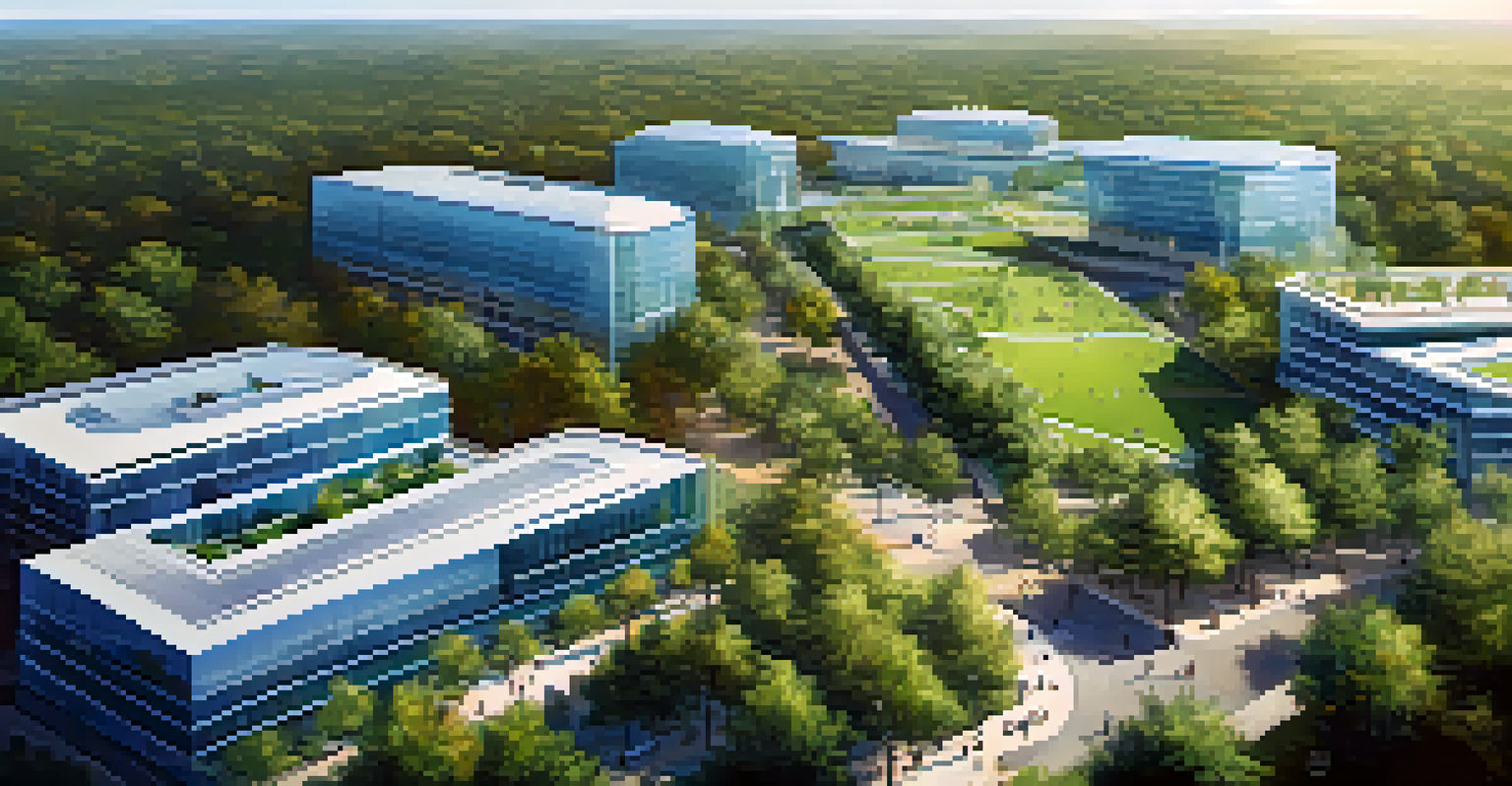The Growth of Raleigh: Economic Changes Throughout History

The Early Days: Raleigh's Foundation and Economy
Raleigh was established in 1792 as the state capital of North Carolina, which set the stage for its economic journey. Initially, the economy was largely agricultural, with tobacco and cotton being the primary crops. The strategic location of Raleigh, positioned at the intersection of major trade routes, facilitated commerce and attracted settlers seeking opportunities.
Education is the most powerful weapon which you can use to change the world.
As the city grew, so did its infrastructure, with roads and railroads connecting it to other regions. This development spurred local businesses and created jobs, laying the groundwork for a more diverse economy. The early economy was characterized by small-scale farming and artisanal trades, reflecting the needs of a burgeoning community.
Over time, Raleigh's role as a political and educational hub began to shape its economic landscape. The establishment of institutions like North Carolina State University in 1887 further contributed to the city's growth, fostering a culture of learning and innovation that would influence future economic changes.
The Industrial Revolution: A Shift in Economic Focus
The Industrial Revolution marked a pivotal shift in Raleigh's economy, as factories and manufacturing began to take root. This era saw the rise of textile mills and tobacco processing plants, which provided jobs and attracted a workforce from rural areas. The influx of laborers transformed the demographic makeup of the city, leading to urbanization.

As industries flourished, so did the need for a skilled workforce. This prompted local educational institutions to adapt their curriculums to meet the demands of emerging industries, further intertwining Raleigh's economic development with its educational infrastructure. The city began to shed its purely agricultural identity, embracing a more industrial character.
Raleigh's Economic Evolution
Raleigh transitioned from an agricultural economy to a diverse industrial and technology-driven landscape.
Moreover, this period laid the foundation for future economic resilience. The diversification of industries made Raleigh less dependent on agriculture, allowing it to withstand economic downturns more effectively. The growth of manufacturing set the stage for further advancements in technology and innovation in the years to come.
Post-War Growth: Raleigh's Economic Resurgence
After World War II, Raleigh experienced significant economic growth, driven by an influx of returning veterans and their families. The GI Bill allowed many to pursue higher education, which in turn fueled the demand for skilled labor. This period marked a renaissance for the city, with new businesses and residential developments springing up across the landscape.
The future belongs to those who believe in the beauty of their dreams.
The establishment of the Research Triangle Park in 1959 was a game-changer, positioning Raleigh as a leader in research and technology. This innovative hub attracted major companies and startups alike, creating thousands of jobs and enhancing the local economy. The collaboration between universities and industries fostered a culture of innovation that continues to thrive today.
As the city evolved, so did its economy, becoming increasingly reliant on technology and research rather than traditional industries. This shift not only spurred economic growth but also attracted a highly educated workforce, further solidifying Raleigh's reputation as a center for innovation and development.
The Rise of Technology: Raleigh Becomes a Tech Hub
In the late 20th and early 21st centuries, Raleigh emerged as a prominent technology hub, thanks largely to its proximity to educational institutions and Research Triangle Park. Companies specializing in software development, biotechnology, and telecommunications began to flourish, bringing with them a wave of investment and job opportunities. This technological boom transformed the local economy, making it increasingly dependent on high-tech industries.
The city's commitment to fostering a supportive environment for startups played a crucial role in this transformation. Initiatives such as incubators and funding programs encouraged entrepreneurs to establish businesses in Raleigh, further diversifying the economy. As a result, the job market expanded significantly, attracting talent from across the nation.
Education Fuels Innovation
The presence of educational institutions has been crucial in developing a skilled workforce and fostering economic growth.
Moreover, the tech industry's growth has had a ripple effect on other sectors, including real estate, education, and healthcare. With a thriving job market, Raleigh has become an attractive destination for young professionals and families, driving population growth and demand for housing. This shift has reshaped the city's economic landscape, positioning it for continued growth.
Demographic Changes: Shaping Raleigh's Economic Landscape
As Raleigh's economy evolved, so did its demographic profile. The influx of tech workers and professionals from diverse backgrounds has contributed to a vibrant and dynamic community. This demographic shift has brought new cultural influences and consumer preferences, reshaping local markets and businesses.
The rise in population has also led to increased demand for services and infrastructure. Schools, healthcare facilities, and recreational spaces have had to adapt to accommodate the growing community. Local businesses have responded by diversifying their offerings, catering to a broader audience and enhancing the overall quality of life in Raleigh.
Furthermore, this demographic change has fostered a spirit of inclusivity and innovation. As various cultures and ideas converge, Raleigh has become a melting pot of creativity, driving economic growth through collaboration and entrepreneurship. The city's ability to embrace diversity continues to be a key factor in its economic success.
The Impact of Education: Raleigh's Knowledge Economy
Education has played a vital role in shaping Raleigh's economy, with institutions like North Carolina State University and nearby universities providing a skilled workforce. The emphasis on research and development has fostered a culture of innovation, attracting businesses that seek to leverage cutting-edge technology. This knowledge economy has become a cornerstone of Raleigh's growth story.
Moreover, partnerships between educational institutions and local businesses have created a symbiotic relationship that benefits both parties. Internships, research collaborations, and job placement programs ensure that graduates are well-prepared to meet industry demands, while companies gain access to fresh talent and innovative ideas. This collaboration has been instrumental in driving economic growth.
Embracing Diversity for Growth
Demographic changes and a vibrant community have reshaped Raleigh's markets and driven economic success through inclusivity and collaboration.
As Raleigh continues to evolve, the focus on education remains crucial. The city is investing in new educational initiatives and programs to ensure that its workforce remains competitive in a rapidly changing economy. This commitment to education not only enhances the local job market but also solidifies Raleigh's position as a leader in innovation and technology.
Challenges and Opportunities: Navigating Economic Changes
Despite its many successes, Raleigh faces challenges as it navigates economic changes in the modern era. Rapid population growth has put pressure on infrastructure, leading to traffic congestion and rising housing costs. Addressing these challenges is essential to maintaining the city's quality of life and economic vitality.
Moreover, the transition to a knowledge-based economy brings its own set of hurdles. As industries evolve, workers must adapt to new technologies and skill requirements, necessitating ongoing education and training. This shift highlights the importance of lifelong learning and workforce development as key components of Raleigh's economic strategy.

However, with challenges come opportunities. Raleigh's strong entrepreneurial spirit and commitment to innovation position it well for continued growth. By investing in sustainable practices and infrastructure improvements, the city can ensure that it remains an attractive destination for businesses and residents alike, paving the way for a prosperous future.